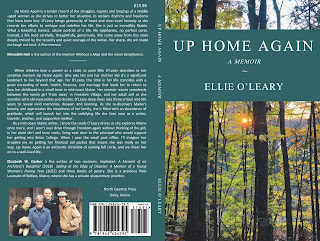Villanelle
The villanelle is a French form that comes from Italian folk lore. The name derives from both villa and villain. The poem “Villanelle” by the French poet, Jean Passerat (1534-16020, was the first poem using the strict form that we now know as the villanelle.
The villanelle has 6 stanzas – five
with three lines and the final one with four. In the first stanza, the first
and third lines rhyme with each other as do all the middle lines of all the first
five stanzas. The first and third lines of the first stanza are the final lines,
in alternating order of each of the next three-line stanzas. The sixth stanza,
with four lines, has the first line rhyme with the very first line in the poem
and the second line rhymes with the second line in the poem. The final two
lines of the stanza are the two lines that repeated throughout the poem.
Rather than give you charts and graphs
with numbers and letters of the rhyme schemes and repetitions, I’ll give some
examples.
There are some well-known poems in this
form, particularly Dylan Thomas’s “Do Not Go Gentle Into That Good Night” and
Elizabeth Bishop’s “One Art”. Both are copied below. My best advice for writing
one of these is to choice your rhyming words carefully. Don’t use “rabbits” (I
know from experience.) or “oranges”(I’m not even going to try.). You’ll only
make it more difficult. My poem “Say Goodbye to the Rabbits” is below and my
only other published villanelle is “Three Firsts” – yesterday’s occasional
poem.
Do Not Go Gentle Into That Good Night – Dylan
Thomas
Do not go gentle into that good night,
Old age should burn and
rave at close of day;
Rage, rage against the
dying of the light.
Though wise men at their
end know dark is right,
Because their words had
forked no lightning they
Do not go gentle into that
good night.
Good men, the last wave
by, crying how bright
Their frail deeds might
have danced in a green bay,
Rage, rage against the
dying of the light.
Wild men who caught and
sang the sun in flight,
And learn, too late, they
grieved it on its way,
Do not go gentle into that
good night.
Grave men, near death, who
see with blinding sight
Blind eyes could blaze
like meteors and be gay,
Rage, rage against the
dying of the light.
And you, my father, there
on the sad height,
Curse, bless, me now with
your fierce tears, I pray.
Do not go gentle into that
good night.
Rage, rage against the
dying of the light.
One Art – Elizabeth Bishop
The art of losing isn’t hard to master;
so many things seem filled with the intent
to be lost that their loss is no disaster.
Lose something every day. Accept the fluster
of lost door keys, the hour badly spent.
The art of losing isn’t hard to master.
Then practice losing farther, losing faster:
places, and names, and where it was you meant
to travel. None of these will bring disaster.
I lost my mother’s watch. And look! my last, or
next-to-last, of three loved houses went.
The art of losing isn’t hard to master.
I lost two cities, lovely ones. And, vaster,
some realms I owned, two rivers, a continent.
I miss them, but it wasn’t a disaster.
—Even losing you (the joking voice, a gesture
I love) I shan’t have lied. It’s evident
the art of losing’s not too hard to master
though it may look like (Write it!) like disaster.
And my own: Say Goodbye to the Rabbits
I’ll say goodbye to the rabbits.
The landlord needs this space so
I’ll have to
move now, make new habits.
This home my
writing inhabits
will be changed
after I go,
once I say
goodbye to the rabbits.
I’ve grown fond
of the wildlife that cohabits
this view of
the saltmarsh, though
I have to move
now, make new habits.
I say goodbye
to the deer, the abbots
of the
saltmarsh, to the leaves, the snow
while I say
goodbye to the rabbits.
My life had
bloomed, where now I blab its
change to all
the writers I know.
I am moving
now, making new habits.
I think
“opportunity” as I grab its
challenge, even
though by now I know
I have said
goodbye to the rabbits
I have moved
now, made new habits.

Comments
Post a Comment